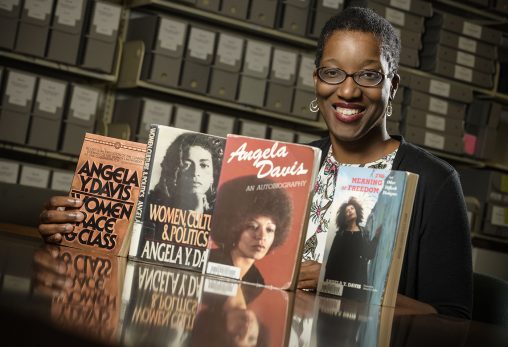
Sharon Lynette Jones, professor of English language and literatures and director of the African and African-American Studies program, will have her book on civil rights activist Angela Davis published next May. (Photo by Chris Snyder)
When she was a young girl, Sharon Lynette Jones was given a book by her mother called “The Black Woman: An Anthology,” a collection of works from female African-American writers. When Jones got older, she realized that the black feminist ideas in the book had helped shape her interest in literature, history and cultural traditions.
Now, Jones, professor of English language and literatures and director of the African and African American Studies program at Wright State University, is the editor of her own book about a black woman — prominent civil rights activist Angela Davis.
Jones has signed a contract with University Press of Mississippi to produce “Conversations with Angela Davis.” The book is scheduled to be published in May 2021. Jones is the editor and responsible for an introduction, chronology and other information. The book project took extensive research and involved visits to archives around the country.
Jones has been to Atlanta to comb through the archives of Emory University. In addition to returning to Emory, she plans visits to archives in California, Alabama, Michigan, Virginia, Illinois, Massachusetts, Florida and the Schomburg Center for Research in Black Culture, a research library of the New York Public Library and an archive repository for information on people of African descent worldwide.
Casting such a wide net is almost a necessity when it comes researching Davis because of her storied history and decades of activism for social justice.
Davis emerged as a prominent counterculture activist and radical in the 1960s as a leader of the Communist Party USA and had close relations with the Black Panther Party through her involvement in the civil rights movement. She was on the FBI’s “10 Most Wanted List,” spent 18 months in jail, and was prosecuted for conspiracy involving the 1970 armed takeover of a California courtroom in which four persons were killed, but was acquitted.
Davis is distinguished professor emerita of history of consciousness and of feminist studies at the University of California, Santa Cruz. Her research interests are feminism, African-American studies, Marxism, popular music, social consciousness and the philosophy and history of punishment and prisons. She co-founded Critical Resistance, an organization working to abolish the prison-industrial complex.
“I have been collecting interviews with Angela Davis that have been published in a variety of places,” said Jones. “Seeing magazines from the 1970s that were covering Angela Davis really helped provide additional context for the interviews I had been reading.”
At Emory, Jones discovered a Soviet publication with Davis on the cover. In 1971, the CIA estimated that 5 percent of Soviet propaganda efforts were directed towards the Angela Davis campaign. Jones also turned up Angela Davis greeting cards and a flier for a barbecue that were used to raise money for Davis’ legal defense.
“I’m very much interested in interviews that took place when Davis was in prison and shortly after she was released, in the 1970s,” said Jones. “But also in the 1980s, especially when she was a vice presidential candidate with the American Communist Party.”
Jones spent her teen years in Anderson, South Carolina. She earned her bachelor’s and master’s degrees in English from Clemson University, worked as an English instructor at Clemson and then went to the University of Georgia, where in 1996 she completed her Ph.D. in English and focused on American and African-American literature to 1900. After working as an assistant professor in English at Clemson and then Earlham College, she joined the faculty at Wright State in 2003.
Jones credits Wright State with giving her the freedom to incorporate her research into the classes she teaches.
Jones heard Davis speak when Davis came to Wright State in 2009 and plans to hear her speak Sept. 22 at Ball State.
“If the opportunity presented itself to interview her, I would very much love to do that,” Jones said.
Jones said one of the biggest challenges in doing the book project is that Davis is such a major national and international figure, and has a connection to so many different groups, that there is a massive amount of archival material on her around the country.
Jones believes that defining moments in Davis’ life included the 1963 bombing of a Birmingham church by white supremacists that killed four young black girls, the time Davis spent as a student at Brandeis University and in Europe, her social activism in 1960s California and her time as a fugitive.
“I think her legacy will be as somebody who was a person of great conscience and conviction who spent so much of her life working towards civil rights of other people even when it was at her own risk and peril,” said Jones.
She said she admires Davis for her historic role as an activist and scholar and for her commitment to social justice.
“I feel that a lot of her ideas about the connections between gender, race and class were a really important way of looking at society,” Jones said. “Her perspectives and ideas have had a great influence on me and the way I look at the world.”

 Wright State student-athletes make a lasting impact on local family, more to come
Wright State student-athletes make a lasting impact on local family, more to come  Wright State names Rajneesh Suri dean of Raj Soin College of Business
Wright State names Rajneesh Suri dean of Raj Soin College of Business  ‘Only in New York,’ born at Wright State
‘Only in New York,’ born at Wright State  Wright State president, Horizon League leaders welcome new commissioner
Wright State president, Horizon League leaders welcome new commissioner  Wright State celebrates homecoming with week-long block party
Wright State celebrates homecoming with week-long block party 